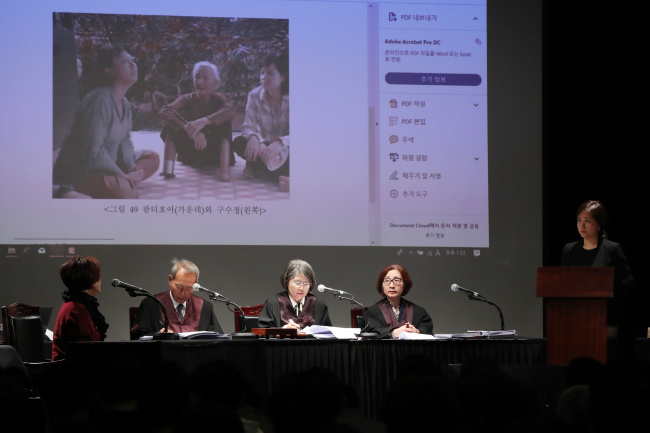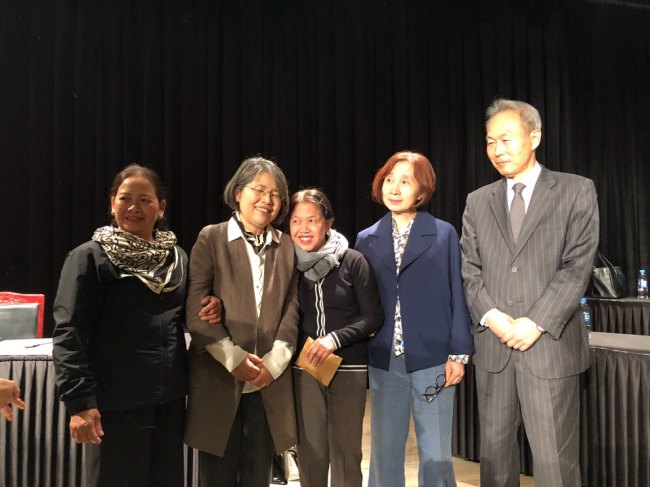Two Vietnamese women sat nervously in a mock trial on Sunday as they awaited the ruling on their case against South Korea over massacres that took place during the Vietnam War.
“Defendant South Korea should pay reparations accordingly to the State Compensation Act and officially recognize its liability (in the massacre) to regain the dignity and honor of the plaintiffs,” Kim Young-ran, former Supreme Court Justice, delivered the ruling as the chief judge of the mock trial.
As Kim read out the verdict, the two women stood up and clapped, shedding tears to celebrate the moment when their horrible experience was recognized for the first time before Korean judges.
During the 1960-1975 Vietnam War, more than 320,000 South Korean soldiers were dispatched to the country to support the United States that was fighting communists. While the South Korean soldiers were hailed as patriots here, some Vietnamese claim the Korean troops brutally killed thousands of civilians, in villages such as Phong Nih, Phong Nhat and Ha My in Quang Nam Province.
 |
| The judging panel explains the trial process of “People’s Tribunal,” a hypothetical court organized by the Korea-Vietnam Peace Foundation, at the Oil Tank Culture Park in Sangam-dong, Seoul on Sunday. Yonhap |
According to the Korea-Vietnam Peace Foundation, the death toll of these massacres was estimated to be 9,000 or higher. But neither the South Korean nor the Vietnamese government officially recognize liability.
“I am so happy that my body is trembling. I know it is a hypothetical court, but the ruling is very meaningful to me. I believe today’s result would send condolences to the victims and survivors in Vietnam,” Nguyen Thi Thanh from Phong Nhi village said.
The two surviving victims, who have the same name, demanded official apologies from the South Korean government and compensation at the two-day “People’s Tribunal” organized by the Korea-Vietnam Peace Foundation and other civic groups.
On the first day of the hearing on Saturday, the two women gave testimonies on losing their family members to the brutality of Korean troops.
“I was only 8 when I lost my mother, older sister, younger brother, aunt and cousin, in the attack on Feb. 12, 1968,” Thanh from Phong Nhi Village said. “I was shot in my stomach and I vividly remember myself trying to find my mother in the chaos while holding my own intestines in my hands.”
In her village, 74 civilians, including the elderly, women and infants were killed.
 |
| Two Vietnamese survivors and panelists pose at “People’s Tribunal,” a mock trial on the massacre of Vietnamese allegedly carried out by South Korean troops during the Vietnam War, at the Oil Tank Culture Park in Sangam-dong, Seoul on Sunday. Jo He-rim/The Korea Herald |
“I did not know why such a tragedy happened to my family. And even after 50 years, I still do not know why such cruel massacre had to occur.”
Thanh of Ha My village, who also lost her mother, a younger brother, an aunt and a cousin, also recounted the horror in her village where 135 civilians were killed.
“I cannot forget my brother crying, ‘mother feed me,’ while in a coma for four days before he died. Even now, the screams and the voice of my brother echo in my head,” Thanh, who lost her hearing in the left ear in the attack, said.
The killings in Ha My village occurred 10 days after the massacre in Phong Nhi. Thanh was eleven.
At the mock trial, the legal representatives of the plaintiffs argued that the killings were deliberate, offering as evidence photographs, documents and testimonies from witnesses. They demanded South Korea take responsibility for compensation to the victims, to conduct a comprehensive investigation, and to officially acknowledge its liability in the massacre.
The attorneys speaking on behalf of South Korea cited lack of evidence in defending against the plaintiff’s arguments, adding that killings could have been led by the Vietnamese National Liberation Front disguising themselves as South Korean troops.
It also said even if the killings were carried out by South Korean troops, it would not be in violation of law as the villages where the massacres occurred were under the influence of the National Liberation Front and that the victims could well have been NLF members or supporting NLF fighters.
The judge panel ruled against the defendant. It noted that many of the victims were the elderly, children and women, and that more than dozens of victims were killed in one place and concluded that the killings were deliberate civilian massacres. It added the attorney’s claims were contradictory, as the NLF would not want to kill its own people.
Along with compensation, the judges ordered the South Korean government to conduct a fact-finding investigation into all possible irregularities committed by the South Korean troops against civilians during the war.
“The government should inform the public about its wrongdoings by exhibiting the results of the fact-finding mission in all public facilities that advertise Korea taking part in the Vietnam War,” Kim added.
The two Vietnamese survivors, as part of their weeklong trip to Korea, held a press conference demanding an official apology from the South Korean government and veterans, in front of Cheong Wa Dae on Monday. The Korea-Vietnam Peace Foundation, which organized the visit, said the government should not ignore the victims’ voice.
President Moon Jae-in has made expressions of regret to Vietnam on a couple of occasions. In November 2017, Moon said that South Korea has a “debt of heart” to Vietnam in a video clip that was shown in the opening ceremony of the Ho Chi Minh City-Gyeongju World Culture Expo 2017.
In meeting with Vietnamese President Tran Dai Quang during his three-day state visit to Vietnam in March, Moon expressed regret about the unfortunate history in the minds of both countries.
Today, South Korea is Vietnam’s biggest foreign investor and second-biggest donor in official development assistance. Vietnam is Korea’s third-largest trading partner.
By Jo He-rim (herim@heraldcorp.com)

